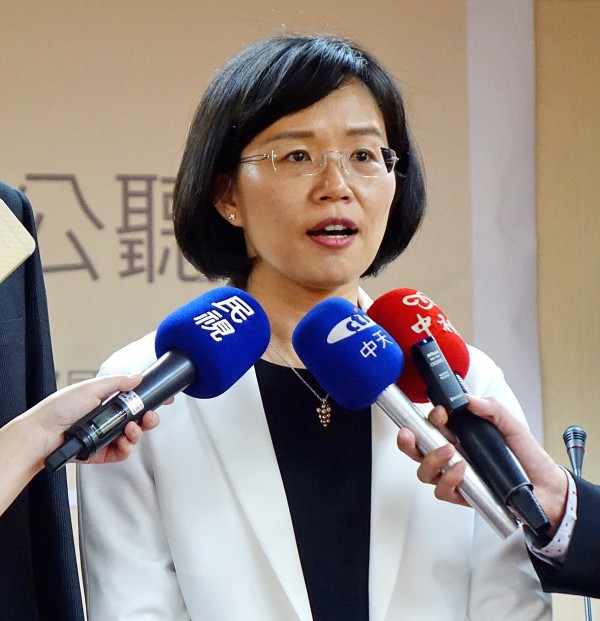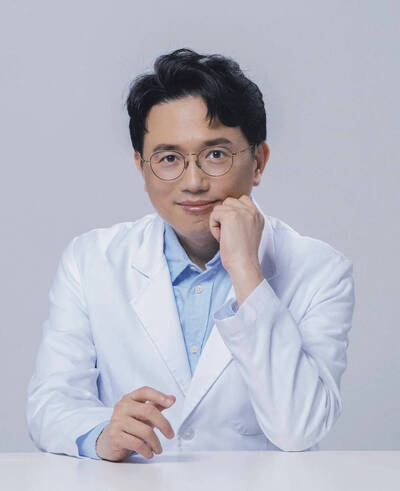《TAIPEI TIMES》 DPP lawmakers back change to presidential system

Democratic Progressive Party Legislator Su Chiao-hui speaks at a public hearing in Taipei on April 17. Photo: Chien Jung-fong, Taipei Times
By Yang Chun-hui and William Hetherington / Staff reporter, with staff writer
A proposal to amend the Constitution and transform the government into a true presidential system has been sent to the Executive Yuan after receiving support from 41 Democratic Progressive Party (DPP) legislators.
The proposal follows findings from the party’s think tank, the New Frontier Foundation, which were brought up for discussion during Sunday’s DPP National Congress, after which the proposal was raised by DPP legislators Su Chiao-hui (蘇巧慧), Chang Hung-lu (張宏陸) and others.
With 41 lawmakers supporting it, the proposal has already passed the 29-legislator threshold — or one-quarter of all legislators — required for it to be sent for consideration, the party said.
Legislators said that while a democracy ought to be a responsible form of government where authority and responsibility is clearly demarcated, the current Constitution does not facilitate this.
The current system is like a Cabinet system where things “operate in a backward manner,” they said, adding that this makes it difficult for the government to execute legal and practical operations.
A presidential system is more in line with the public will, they said.
If it is passed, the proposal will see the abolition of the Executive Yuan and the premiership, with those affected being reassigned by the president.
Under a presidential system the president has the highest level of executive power, oversees national affairs conferences, submits annual budget reports to the Legislative Yuan, makes decisions on imposing martial law and granting amnesty, makes declarations of war, signs peace treaties and passes resolutions on proposals made during national affairs conferences.
The authority of the Examination Yuan would be absorbed into the executive branch, which will be a new independent body.
More authority will be given to Aborigines through the appointment of a minimum quota of Aboriginal legislators, with smaller Aboriginal groups coordinating on the appointment of shared representatives.
The Legislative Yuan will deal with accusations of and investigations into government misconduct, handling such cases through the execution of the law.
In regard to the relationship between legislative and executive authority, the president will be required to submit reports on the state of national affairs and planned legislation within one month of every second meeting at the Legislative Yuan. The president will also be required to send reports on closed and planned budgets to the Legislative Yuan before specified deadlines. Ministers will be required to report to legislative committees upon request and will not be permitted to abstain from hearings, while question-and-answer sessions will no longer be held for Cabinet members. The current system whereby lawmakers can pass votes of no confidence to dismiss the Cabinet, and in which the president can dismiss the legislature, will be abolished.
The threshold for sending legal, budget and amendment proposals to the Legislative Yuan will be changed from 50 percent in support to two-thirds support from lawmakers.
Although there have been six changes to the Constitution, the operations of the government remain relatively unclear, Su said, adding that she hopes a presidential system will better balance administrative authority, with a clearer demarcation of executive, legislative and judicial powers.
Su said every country has a different political system and there is no “best” system, but each country should employ the system most suitable for its needs.
The system of two heads of state used in Taiwan has brought conflicts, she said, adding that after the 30 years of democratic development a new political system is needed to better clarify administrative authority.
新聞來源:TAIPEI TIMES

Democratic Progressive Party Legislator Chang Hung-lu takes part in a question-and-answer session on Sept. 29 last year. Photo: Chien Jung-fong, Taipei Times













